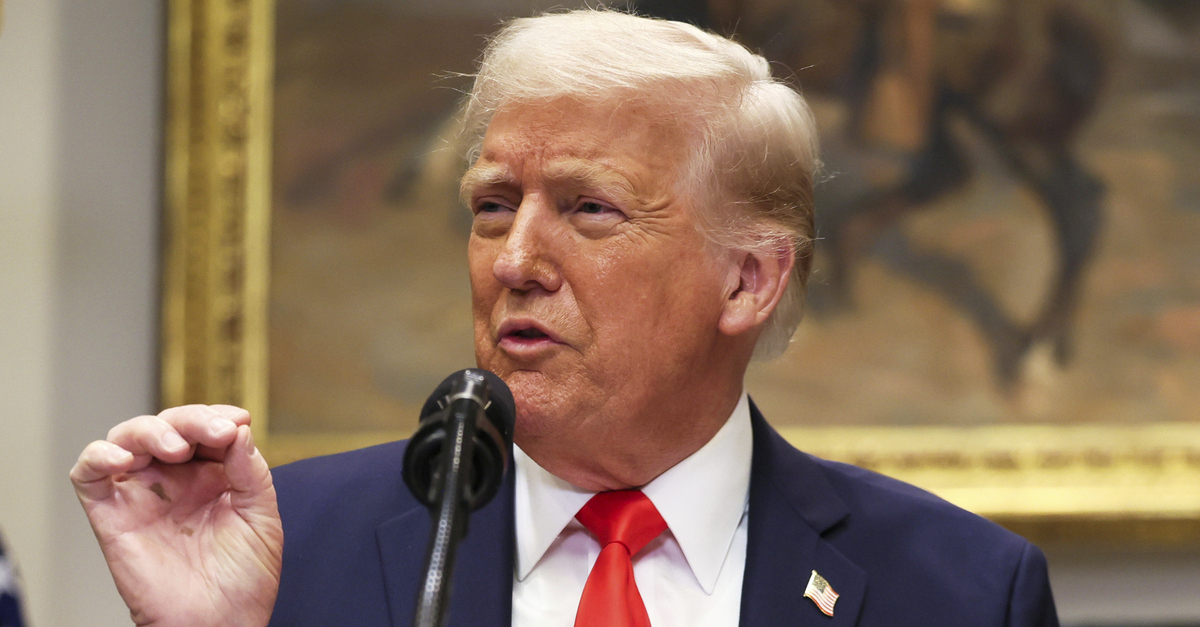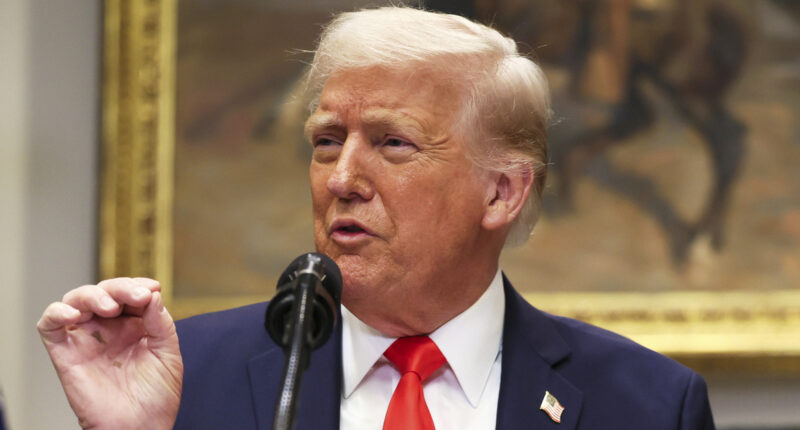
President Donald Trump speaks in the Roosevelt Room of the White House in Washington, Monday, March 3, 2025 (Pool via AP).
During a court hearing in front of the U.S. Circuit Court of Appeals for the District of Columbia, the Trump administration faced challenges in justifying the use of an old wartime authority to deport Venezuelan migrants to El Salvador without proper legal procedures. One judge even remarked that Nazis had received better treatment when the same law was previously enforced.
Deputy Assistant Attorney General Drew Ensign from the Department of Justice struggled to convince U.S. Circuit Judge Patricia Millett during the hearing. Judge Millett appeared unimpressed by the DOJ’s arguments that a district court’s decision to halt deportations under the authority was an infringement on the president’s powers during wartime.
Judge Millett expressed particular worry about over a hundred Venezuelan individuals accused of being part of gangs who were deported to El Salvador with no opportunity to challenge the deportation orders. This happened shortly after President Trump invoked the Alien Enemies Act of 1798, making him the first president since World War II to utilize this law.
‘There were planeloads of people. There were no procedures in place to notify people,” she said during the hearing. “Nazis got better treatment under the Alien Enemies Act than has happened here, where the [Nazi] proclamation required the promulgation of regulations and they had hearing boards before people were removed. And yet here, there’s nothing in there about hearing boards, there’s no regulations, and nothing was adopted by the agency officials that were administering this. The people weren’t given notice, they weren’t told where they were going. Those people on those planes on that Saturday had no opportunity to challenge their removal.”
The statute — which has only been invoked three times previously, all during wars — authorizes the president to summarily remove “natives, citizens, denizens, or subjects” of a “hostile nation or government” when there is “declared war” against it or when it has “perpetrated, attempted, or threatened against the territory of the United States” an “invasion or predatory incursion.” In a controversial and novel use of the power, Trump declared the Venezuelan gang Tren de Aragua (TdA) had committed or attempted an “invasion” or “predatory incursion” such that any member of the group was summarily removable under the Act.
U.S. District Judge James E. Boasberg on Monday morning also refused to lift his temporary restraining order on the use of the AEA for deportations, reasoning that the detained migrants were “entitled to individualized hearings to determine whether the Act applies to them at all.”
The DOJ asserted that Boasberg’s order “second-guessed” Trump’s determination that the gang’s presence in the U.S. constituted an “invasion” under the terms of the statute, but Millett repeatedly brought the conversation back to whether those detained had a mechanism to challenge if they even fit the criteria of Trump’s proclamation.
The judge stated that the case comes down to whether the Trump administration’s implementation of the AEA was unconstitutional.
“The question is whether the implementation of this proclamation without any process to determine whether people qualify under it — I mean if the government says we don’t have to give a process for that,” she said. “I mean y’all could’ve picked me up Saturday and thrown me on a plane thinking I’m a member of Tren de Aragua and given me no chance to protest it, and somehow it’s a violation of presidential war powers for me to say, ‘No I’m not. I’d like a hearing.””
When Ensign tried to push back by claiming there was nothing in the record to indicate anything like that happening, Millett interrupted to point out there was virtually no record for the migrants who were already in El Salvador because the government deported them “super fast” and without any due process.
Millett continued to hammer Ensign for the better part of an hour, accusing the Trump administration of misunderstanding the law.
“The problem here is, they are challenging implementation of the proclamation that never gave anyone a chance to say, ‘I’m not covered.’ And if you’re argument is, ‘We didn’t have to do that, it’s an intrusion on the president’s war powers, that courts are paralyzed to do anything,’ then that’s a misreading of precedent, it’s a misreading of the text of the Alien Enemies Act, and that can’t be an unlawful intrusion on the president’s powers. The president has to comply with the constitution like everybody else.”
While Millett did the majority of the talking for the panel and appeared unambiguously inclined to rule against the administration, Circuit Judge Justin Walker seemed convinced that the case should have been brought in Texas, not Washington, and avoided discussing the merits during his questioning. The third judge, Karen L. Henderson, did not ask any questions during the hearing.
Love true crime? Sign up for our newsletter, The Law&Crime Docket, to get the latest real-life crime stories delivered right to your inbox.











